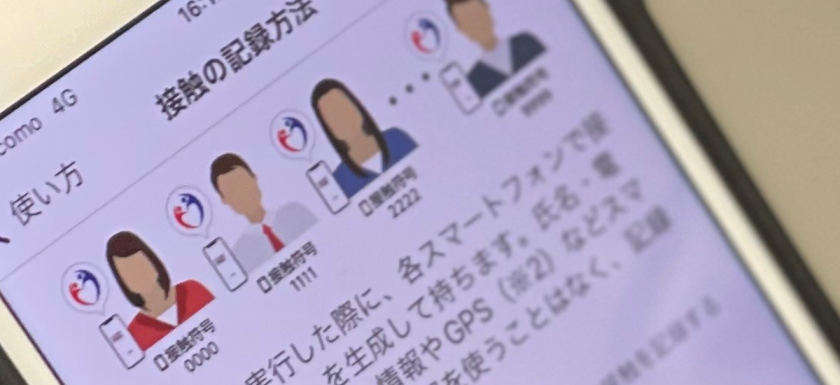
Source: The Authors
Copyright: The Authors / Seiji Bito
URL: https://formative.jmir.org/2022/7/e37720
License: Creative Commons Attribution (CC-BY)
Tokyo, Japan, July 25th, 2022__COCOA, a mobile app developed and promoted by the Ministry of Health, Labour and Welfare in Japan (MHLW) to counter the spread of COVID-19, is an app that allowed individuals with positive test results to register themselves as infected using the app and Bluetooth function of their smartphones. The app notifies the users if they had come into close contact with a registered individual. Unlike those developed and operated in South Korea and China, this app was not designed to track the movement history of users using the GPS function or collect data on the movement history of users for use in infection prevention measures. The app functions were intentionally limited to prevent the leakage of the privacy information of the citizens who installed it. Consequently, COCOA has been criticized for not being extremely effective in preventing the spread of infectious diseases.
Therefore, if an app developer (MHLW in this case) distributes an app that can collect smartphone users’ privacy information more effectively than COCOA and uses the data to reflect them in various administrative measures, to what extent will individuals accept such an app with such functions? What benefits would increase their sense of acceptance instead of installing an app with such privacy risks? Dr Seiji Bito and his colleagues at the Clinical Research Centre of the National Hospital Organization Tokyo Medical Centre conducted a web-based survey of 1053 adult Japanese residents to answer these questions. The study was funded by the Japan Science and Technology Agency (RISTEX Comprehensive Practical Research and Development Program for Ethical, Legal, and Social Issues of Science and Technology, research director: Shigeto Yonemura, Faculty of Law, University of Tokyo; grant JPMJRX20J5).
According to the survey, it is assumed that the following functions are included to the current functions of COCOA: (1) automatic registration of individuals with positive test results to the MHLW database; (2) in addition to function 1, location-tracking and notification functions; and (3) a function to reflect on infection prevention measures based on the user’s movement information database. The proportion of respondents who answered that they “definitely do not want to use” or “feel great resistance” to using apps with each of these additional functions were 27.3%, 31.4%, and 33.6% out of the total number of respondents for functions 1, 2, and 3, respectively. Furthermore, if the aforementioned functions were to be included in the COCOA app and its effect would be to halve the number of new infections, individuals would be more motivated to use the app, whereas if the exchange was a discount on personal mobile phone usage fees, resistance to use would be rather strong. For individuals, at least in the case of an event that threatens the entire population, such as the recent COVID-19 outbreak, the contribution to health benefits on a collective basis, such as infection prevention, is more motivating than that of individual financial benefits, overcoming the risk of personal privacy leaks. Eventually, the result will be an important suggestion for the plan and operation of various administrative strategies in the information society, which will be accompanied by the risk of privacy leakage and misuse of information.
Dr Bito states that as the Internet of Things society eventually becomes a reality, it is necessary to have a nationwide discussion among various stakeholders, including administrative bodies, on the balance between the protection of personal privacy and public interests for a more convenient world, and based on the survey findings, further research and study projects and events that promote social dialogue are needed. Details of the study’s findings were published in JMIR Formative Research. Further information can be downloaded from the following URL.
Original article:
Bito S, Hayashi Y, Fujita T, Yonemura S. Public Attitudes Regarding Trade-offs Between the Functional Aspects of a Contact-Confirming App for COVID-19 Infection Control and the Benefits to Individuals and Public Health: Cross-sectional Survey. JMIR Form Res 2022;6(7):e37720
URL: https://formative.jmir.org/2022/7/e37720
doi: 10.2196/37720
PMID: 35610182
For enquiries about this announcement, please contact:
Seiji Bito, Director, Division of Clinical Epidemiology, National Hospital Organization Tokyo Medical Center Clinical Research Center
E-mail seiji.bito●kankakuki.jp (● contains @)
About JMIR Publications
JMIR Publications is a leading, born-digital, open-access publisher of 30+ academic journals and other innovative scientific communication products that focus on the intersection of health and technology. Its flagship journal, the Journal of Medical Internet Research, is the leading digital health journal globally in content breadth and visibility, and it is the largest journal in the medical informatics field.
To learn more about JMIR Publications, please visit https://www.jmirpublications.com or connect with us via YouTube, Facebook, Twitter, LinkedIn, or Instagram.
If you are interested in learning more about promotional opportunities, please contact us at communications@jmir.org
The content of this communication is licensed under the terms of the Creative Commons Attribution License (https://creativecommons.org/licenses/by/4.0/), which permits unrestricted use, distribution, and reproduction in any medium, provided the original work, published by JMIR Publications, is properly cited. JMIR is a registered trademark of JMIR Publications.
